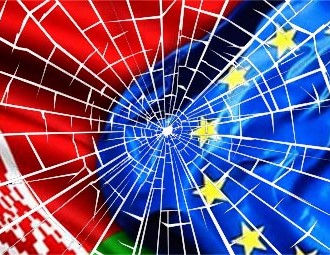A new diplomatic war: European ambassadors leave Minsk

Belarusian Ministry of Foreign Affairs has launched a new diplomatic war under the pretext of combating the sanctions. As a result, the ambassadors of the EU countries are leaving Belarus, the President of the European Parliament has called Minsk...
Belarusian Ministry of Foreign Affairs has launched a new diplomatic war under the pretext of combating the sanctions. As a result, the ambassadors of the EU countries are leaving Belarus, the President of the European Parliament has called Minsk actions "a hostile act", while the very sanctions have not vanished. It seems that, on the contrary, the Belarusian authorities are running up against new restrictions.
On Tuesday night, the Belarusian Foreign Ministry finally reacted to the new EU sanctions against the official Minsk. As Information Service of "EuroBelarus” previously reported, it was decided at the EU countries' foreign ministers’ meeting in Brussels on 27th February to include another 21 Belarusian official into the list of persons that are subject to visa and financial sanctions.
The tough reaction
The Belarusian MFA instead, through its spokesperson announced a rather tough reaction to the European Union actions.
"The decision of the European Council makes evident that the EU continues to follow the policy of overt pressure. We have been explaining repeatedly, at all levels, the futility of such a policy in relations with the Republic of Belarus. In response, the Belarusian side will forbid the country to those representatives of the European Union, who contributed to introduction of restrictive measures”, is said in a statement on the Ministry website. There was also reported that the Permanent Representative of the Republic of Belarus to the EU and the Belarusian Ambassador in Poland had been recalled to Minsk for consultations.
"The Head of the EU Delegation to the Republic of Belarus and the Polish Ambassador in Belarus are also proposed to leave for their capitals for consultations to inform their leadership of Belarus' firm position that pressure and sanctions are unacceptable.
In case of further pressure on the Republic of Belarus other actions to protect our interests will also be adopted", was said in the Belarusian MFA statement.
Translating from the diplomatic language to the human one, the two European envoys were asked to get out of the country.
The hostile act
The EU leadership has quite promptly reacted to a new trick in Minsk. The President of the European Parliament, Martin Schulz, expressed regret at the decision of Minsk to pull European diplomats from Belarus.
“It is a disproportionate, unhelpful and counterproductive step. Instead of choosing increasing self-isolation, Minsk should make the right choice for its people and open itself towards democracy.This tit-for-tat move will harm further relations between Belarus and the European Union. I consider it as a hostile act", cited Schultz the press service of the European Parliament.
"As the first step, Belarus should release unconditionally and rehabilitate all political prisoners.This would help in a review of the EU's restrictive measures and allow Belarus and the EU to embark on the path of gradual re-engagement", said Schultz, Radio Liberty reported.
Exodus of diplomats
The High Representative of the EU Foreign Policy Catherine Ashton also made an official statement:
"As a result of the Belarusian authorities’ statement that the head of the EU in Minsk and the Polish ambassador are to leave Belarus, we have decided to recall our ambassadors.
In expression of solidarity and unity it was agreed that the ambassadors of the EU member states in Minsk will all be withdrawn for consultations to their capitals. All EU member states will also summon Belarusian ambassadors to their foreign ministries", Ashton is cited by Charter'97.
German Foreign Minister Guido Westerwelle earlier said in Brussels that Berlin would withdraw its ambassador from Minsk, as "measures against the EU and Poland are measures against Germany, as well". Polish Foreign Ministry called the steps of Minsk "unfriendly", and the office of Bronislaw Komorowski informed that the President "regrets to learn about this incomprehensible decision of Alexander Lukashenko”, "Belarusian partisan" announces.
As earlier “EuroBelarus” reports, Štefan Füle commented on situation, “the actions of the official Minsk are counterproductive and will bring no good”.
This way the European Commissioner for Enlargement and Neighbourhood Policy Stefan Fule described the last démarche of the Belarusian leadership to the European Union.
"Any actions that alienate us from the most important goals, which are, firstly, the release and rehabilitation of all political prisoners, and secondly, the restoration of relations with Belarus and its citizens, - will not bring any good and are counterproductive", said Fule on Tuesday at a press conference in Brussels, Russian service of BBC writes.
As reported by France Presse, France also recalled its ambassador from Belarus. The French Ministry of Foreign Affairs promised that their country, together with the European partners, "continues condemning the deteriorating situation with human rights and fundamental freedoms" in Belarus and will further continue to "oppose the repressions of the regime opponents in Minsk".
Scaling the error
First expert assessments of escalation of an international conflict add up to the fact that as a result of the ambassadors’ expulsion, Minsk will rather likely get not remission, but toughening the sanctions. In particular, Minsk shouldn’t probably wait the scheduled IIHF Ice Hockey World Championship for 2014.
Experts also remind that something similar in the Belarusian history had already taken place. In 2008, the U.S. demanded the release of Alaksandar Kazulin and imposed economic sanctions. In response, Minsk expelled the American ambassador, and later severely reduced state of the U.S. Embassy staff in Minsk. This time, the situation repeats itself, but across the whole of Europe. Belarus is actively taking path into a deadlock.
-
03.01
-
07.10
-
22.09
-
17.08
-
12.08
-
30.09








































